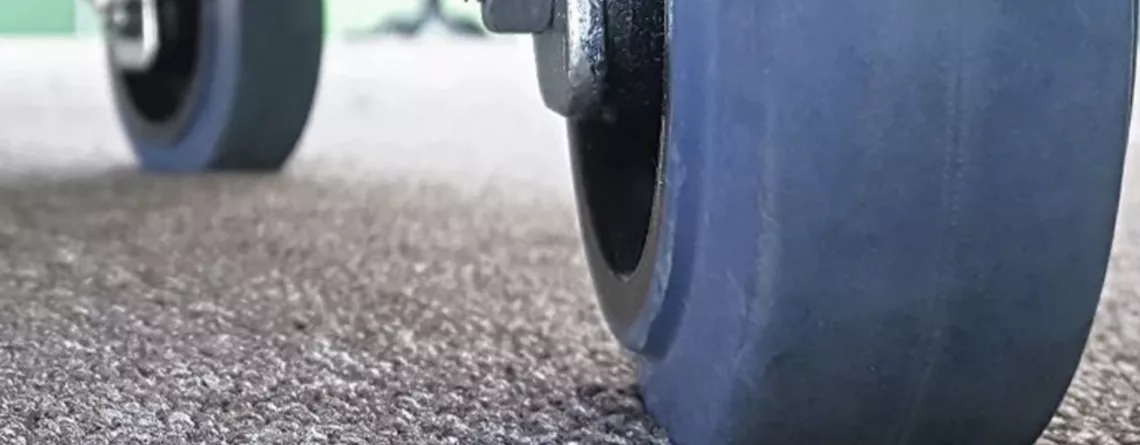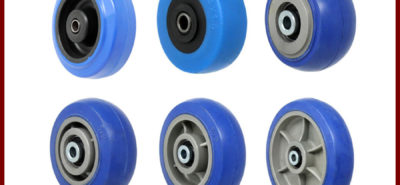Polyurethane vs. Steel Industrial Casters
Industrial casters play a pivotal role in the mobility and efficiency of equipment across various sectors. Given the array of options available, selecting the right caster is crucial to ensuring optimal performance, durability, and safety.
Among these choices, polyurethane and steel casters stand out for their widespread use and distinct advantages. But do you know the benefits or reasons for using one over the other? If not, then follow along with this Caster City guide as we go over each option so that you can make the best decision.
So, polyurethane vs. steel casters, which one do you need?
Polyurethane casters, available as liquid cast or injection molded, offer versatility and resilience across a range of applications. Steel casters, known for their strength, are the go-to for extreme load-bearing and challenging conditions. Choosing the right material for your industrial casters is foundational to achieving the desired balance between load capacity, floor protection, and maneuverability.
Let’s take a deeper look into the characteristics of each.
What are Polyurethane Casters?
Polyurethane casters offer a versatile solution tailored to a wide range of industrial applications, balancing load capacity with floor protection and maneuverability. Within the polyurethane, two distinct manufacturing processes—liquid cast and injection molded—yield casters with unique characteristics, we will be discussing them both briefly as well.

Benefits of Polyurethane Casters
Reduced Noise
Polyurethane casters excel in noise reduction, providing a quieter operation ideal for noise-sensitive environments. Their shock-absorbing properties significantly diminish sound output compared to harder materials.
Load Capacity and Floor Protection
Both types of polyurethane casters effectively handle substantial loads. However, liquid cast polyurethane is particularly suited for applications where equipment remains stationary for extended periods.
This type maintains its shape and integrity under static pressure, preventing deformation and flat spots, thus ensuring consistent performance without damaging floors.
Check our range of polyurethane wheels with iron centers here.
Grip and Traction
Polyurethane casters, known for their excellent grip, perform exceptionally well on both smooth and uneven surfaces, reducing slippage and enhancing safety. This feature is crucial in environments with wet or irregular floors.
Corrosion Resistance
With varying levels of resistance to environmental factors, selecting a polyurethane caster that matches your specific conditions is crucial for maximizing lifespan and maintaining functionality.
Diving Deeper into Polyurethane: Liquid Cast vs. Injection Molded Polyurethane

Liquid Cast Polyurethane
This type is renowned for its durability and resilience, especially under static loads. The flexibility and strength of liquid cast polyurethane make it an ideal choice for heavy-duty applications where the caster must withstand heavy weights without deforming. Its resistance to deterioration over time, even with infrequent movement, ensures long-term reliability.

Injection Molded Polyurethane
Optimized for applications requiring frequent and smooth movement, injection molded casters are generally lighter and designed for ease of operation. These casters are particularly suitable for light to medium-duty applications, such as office furniture and hospital beds. However, they may be less suitable for scenarios where casters bear heavy loads without movement for extended periods, as they can lose flexibility and risk chunking—where parts of the tire may break off.
For scenarios where you expect medium to heavy loads to be stationary for extended periods, liquid cast polyurethane tires are a more reliable choice. On the other hand, injection molded polyurethane wheels may be suitable for applications with frequent movement but can be less dependable when subjected to infrequent movement or heavy loads during extended periods of inactivity.
By carefully considering these factors, you can select the polyurethane caster that best fits your operational needs, ensuring optimal performance and longevity.
Check out our comprehensive variety of Polyurethane casters here.
What are Steel Casters?
Steel casters are a good option for most environments and for most people looking for industrial or heavy duty casters. Consult a product application specialist at Caster City to determine which is better for specific environments.

Benefits of Steel Casters
Load Bearing
While polyurethane casters can take quite heavy loads, there is no comparison to similar steel casters, often taking 25-50% more load than a comparable caster in any other material.
If your casters won’t be taking extreme loads, then the benefits of polyurethane outweigh the negative floor wear caused by steel.
Hygienic
Steel casters are almost impervious to damage, so they won’t allow pockets, dents, scratches, or other areas where dirt and germs can survive and live. Often steel casters are coated with chromium oxide, making them even more impervious to almost any form of microscopic agent.
While hygiene may not be necessary for all industrial environments, hospitals, labs, and high-tech facilities will find the hygienic nature of steel casters to be a huge benefit.
Visually Appealing
Steel casters are some of the most visually appealing options available, appearing clean, shiny, and modern in almost any environment. This type of benefit isn’t always needed, especially in industrial applications. But high-tech firms trying to present a specific appearance would find this a significant advantage.
Environments that are using the casters to carry products and present to buyers will see benefits from a more visually appealing overall look.
Durable
Steel casters are more durable than polyurethane in extreme environments. This can include constant heavy loads, temperature extremes, and changes between those temperatures. You’ll also find that heavy chemical exposure will be less of a problem for steel casters.
This isn’t to say polyurethane casters aren’t durable, but when compared side by side in extreme situations, the steel casters will survive longer.
Ease of Care
Steel casters require very little care; they’re durable and won’t require replacing in most situations, and to clean, you can just blast them with water. There’s not going to be much that will stick to steel casters.
Expert Advice: Which Caster to Get? Steel vs. Polyurethane
Ultimately what you need your industrial casters for and what type of environment will determine whether you go with steel industrial casters or polyurethane industrial casters.
Both materials can be used when you need industrial casters with locks and provide similar locking ability, so that shouldn’t play a factor in your decision. However, some cheaper materials won’t come with the same quality or strength of lock.
Polyurethane casters can provide protection to your flooring and are a quieter material, so if those are important in your environment, then polyurethane will be a much better choice.
You’ll also find that polyurethane casters have better traction and grip, so they may be better in environments that need to go over slippery surfaces or up and down elevations. If you have polyurethane industrial casters with locks, then you’ll also have less chance of slipping while the lock is engaged.
Steel casters, on the other hand, can provide much more weight-bearing than polyurethane, but that can come at a price. So if heavy loads but costlier industrial casters work for your needs, then steel casters will likely be a better choice for you.
When implementing steel casters, you will find that they can be more durable in extreme environments, such as cold, heat, chemicals, moisture, and are a much easier material to clean and use in environments that require sterile or hygienic surroundings.
If you need expert advice on your specific situation, or you’re ready to purchase high-quality industrial casters, then you’ll need to contact our sales team who can help you with specific needs.
Ready to optimize your equipment’s mobility and efficiency? Explore our comprehensive range of industrial casters tailored to diverse applications. Whether you lean towards the resilience of polyurethane or the robustness of steel, our experts are here to guide you to the perfect caster solution.
Need advice? The Caster City experts are just a call away, always thrilled to guide you in your caster wheel exploration!




